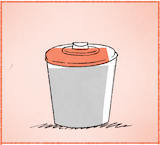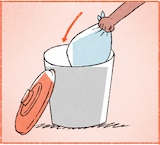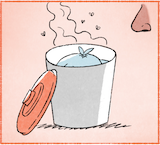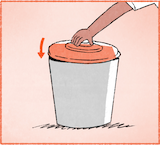



นี้คืออี่หยัง อันนี้เป็นถังเนาะ
เฮากะบ่ฮู้ว่ามันเป็นถังอี่หยัง อาดสิเป็นถังน้ำ หลือว่าถังขะยะ หลือว่าถังอี่หยังกะได้ ที่เฮาสามาดเอาถังนี้ไปใซ้งานได้
แต่ว่าตอนนี้เฮาบ่ฮู้ว่าเขาเอาถังนี้มาใซ้งานเป็นอี่หยัง อาดสิเป็นถังขะยะ อาดสิเป็นถังใส่เข้า อาดสิเป็นถังใส่น้ำเนาะ
แล้วถังนี้ใหญ่บ่ กะเบิ่งซงลักสะนะกะอาดสิใหญ่อยู่ดอกเนาะ ใหญ่เติบ มีฝาพ้อม มีฝาปิดพ้อมเด่ะ ฝามันกะมีหูจับพ้อม ฝาอันบักใหญ่ ถังกะใหญ่พ้อม
แล้วถังนี้มันมีจักถัง กะมีถังเดียวตั้งอยู่ข้อหล้อของมันหนะ ตั้งอยู่อันเดียวของมันนั้นหละ
15
เขากำลังเฮ็ดหญัง มีพุหนึ่งกำลังเอา อาดสิเป็นถุงขะยะเนาะ บ่ฮู้ว่าเป็นถุงอี่หยัง เบิ่งลักสะนะอาดสิเป็นถุงขะยะเนาะ เขาเอาถุงถุงหนึ่งมาถิ้ม หลือว่ามาวางใส่ในถัง ในถังวงกมนั้นเนาะ เขากะเอาถุงขะยะหลือว่าถุงอี่หยังนี้หละมาถิ้มใส่ อาดสิเป็นขะยะเนาะ ขั้นคิดว่าเป็นขะยะเนาะ เขากำลังเอาถิ้มใส่ไป
แล้วเขาเอามาถิ้มหนั้นใส่ ถิ้มใส่จักถุง เขาอาดสิมีถุงเดียวข้อหล้อ เฮาแนมเห็นอยู่หนิกะมีถุงเดียว เขาอาดสิ ถุงใหญ่เติบเนาะ อาดสิถิ้มถุงเดียว แล้วกะเต็มถังพอดีเนาะ
16
อันนี้คืออี่หยัง เกิดอี่หยังขึ้น
เบิ่งไปใน ในนี้แล้วกะ ลู้สึกว่าอาดสิมีกิ่นเหม็น กิ่นเหม็นจากขะยะ
คนเอาขะยะมาถิ้มใส่ในถังขะยะ แล้วเฮ็ดให้กิ่นเหม็น
อาดสิเอาถิ้มไว้โดนแล้ว หลือว่าขะยะนี้อาดสิเป็นขะยะเน่า หลือว่าขะยะที่เก็บไว้โดนแล้ว เฮ็ดให้ขะยะนี้เหม็น หลือว่ามีกิ่นเหม็นอยู่ในละแวกใก้ๆ ถังขะยะนั้น
เฮาฮู้ได้จั่งใดว่ามันมีกิ่นเหม็น กะมีแมง แมงโตน้อยๆ หลือว่าแมงวันแมงหวี่เนาะมาตอมขะยะนี้ กะเลยเฮ็ดให้ฮู้ว่าขะยะนี้มันเหม็นเนาะ
แล้วขะยะเหม็นนี้มันดีต่อสุกขะพาบบ่ บ่ ขะยะเหม็นหลือว่ากิ่นเหม็นๆ หนิ บ่ มันบ่ดีต่อสุกขะพาบเลย ขั้นเฮาอยู่ใก้จุดๆ นี้ หลือว่าใก้หม้องนี้ ทุกมื้อๆ ได้กิ่น ซู่มื้อๆ กะเฮ็ดให้สุกขะพาบล้างกายบ่ดี หลือว่าเฮ็ดให้สุกขะพาบล้างกายบ่แข็งแลงเนาะ
17
เขากำลังเฮ็ดหญัง กะมีพุหนึ่งเนาะถือฝา ฝา อาดสิเป็นฝาถัง[หลือว่า]ฝาถังขะยะนี้หละ เอาไปปิดถังไว้ เพื่อที่อาดสิดับกิ่นเหม็น หลือว่าบ่ให้ถังขะยะนี้มีกิ่น ส่งกิ่นออกไปข้างนอก หลือว่าส่งกิ่นออกไปละแวกใก้ๆ นั้นเนาะ
แล้วเขาปิดสะหนิดบ่ หลือว่าปิดมิดซิดบ่ หลือว่าปิดมิดบ่นั้นหนะ กะปิดมิดอยู่ เขากะใซ้มือของเขาจับฝาถังขึ้นมา แล้วกะปิดลงไป อาดสิปิดสะหนิด ปิดมิดบักคักเนาะ
ขั้นปิดบ่มิด กิ่นในถังขะยะนี้ หลือว่ากิ่นเหม็นกะสิส่งกิ่นออกไปในละแวกใก้ๆ นั้นเนาะ ขั้นปิดมิดแล้ว ขั้นปิดสะหนิดแล้ว กิ่นมันกะบ่สามาดออกไปได้คัก หลือว่ากิ่นกะบ่เหม็นคักปานใดเนาะ
Link to overview page
Link to dictionary
| Isaan | Pronunciation | Tones | Thai | English/Notes |
|---|---|---|---|---|
| นี้ | ni: | HF | นี้ | 1. this 2. here |
| คือ | khʉ: | HR | คือ | 1. to be, to resemble, like, as 2. why {บักหล้าคือบ่เก็บโต่ะแน่ = [addressing a young boy] Why haven't you cleared the table?} |
| อี่หยัง | i:-yaŋ | H-M | อะไร | 1. what {นี้คืออี่หยัง = What is this?} {มื้อนี้เจ้าเฮ็ดอี่หยัง = What are you doing today?} {กินเข้างายกับอี่หยัง = What did you have for breakfast?} 2. something, anything, (in negations) nothing {บ่ต้องเฮ็ดอี่หยังอีกเลยนอกจากใส่ปุย = [we] don't need to do anything besides adding fertilizer} |
| อัน | an | M | อัน | 1. thing, object 2. general clf. for objects |
| เป็น | pen | M | เป็น | 1. to be, to exist 2. to be able to 3. to suffer, sth. happens to 4. เป็นหญัง[...]คือ in initial position: why? {เป็นหญังเขากะคือแปงฟัน = Why is he brushing his teeth?} {เป็นหญังเคี่ยงบินมันคือสิตก = Why is the airplane falling down?} |
| ถัง | thaŋ | M | ถัง | 1. bucket 2. gas/petrol tank {ถังน้ำมัน = gas/petrol tank} |
| เนาะ | nɔ | H | เนาะ | final particle: makes the statement softer, looking for agreement |
| เฮา | hao | HR | เรา | 1. personal pronoun: we 2. personal pronoun: I |
| กะ | ga | M | ก็ | 1. then, consequently 2. also |
| บ่ | bɔ: | H | ไม่ | 1. no, not 2. question particle, transforming a statement into a question Notes: spelling exception in line with common usage on social media |
| ฮู้ | hu: | HF | รู้ | 1. to know 2. to understand Notes: equivalent to ลู้ |
| ว่า | wa: | H | ว่า | 1. that, as {คำว่า X = the word X} 2. to say |
| มัน | man | HR | มัน | it (also used to refer to people) |
| อาด | a:t | LF | อาจ | 1. might, may, will 2. likely |
| สิ | si | M | จะ | future tense auxiliary {เขากำลังสิตื่น = he's about to wake up} {สิไปตะหลาด = [I'm] going to the market} |
| น้ำ | na:m | HF | น้ำ | 1. water 2. drink, soft drink, juice |
| หลือ | lʉ: | M | หรือ | or |
| ถังขะยะ | thaŋ-kha-ya | M-M-M | ถังขยะ | trash can, bin |
| ได้ | dai | HF | ได้ | 1. can 2. to get, to obtain 3. before verb: indicating past tense 4. บ่ได้ + verb: not |
| ที่ | thi: | H | ที่ | 1. that, which {คนที่ยืนอยู่ฝั่งขวา = the person which is standing on the right = the person standing on the right} {เว้าคำที่บ่สุพาบ = to speak words which are impolite = to speak impolitely} 2. for ordinal numbers {ที่สาม = third} |
| สามาด | sa:-ma:t | M-HF | สามารถ | can, to be able |
| เอา | ao | M | เอา | to take, to give {เขากำลังเอาก่องไปซั่ง = he's taking the boxes to weigh them} {หมอกำลังเอายาให้คนป่วยกิน = the doctor is giving medicine to the patient} {เอาไว้ถ้า = is for, is used for, has the purpose of} |
| ไป | pai | M | ไป | 1. to go 2. auxiliary indicating action extending into the future |
| ใซ้งาน | sai-ŋa:n | HF-HR | ใช้งาน | to use, to put to use |
| แต่ว่า | tɛ:-wa: | H-H | แต่ว่า | 1. but 2. only {ฮู้แต่ว่าเขายืนอยู่พุเดียว = I only know that he's standing there by himself} |
| ตอนนี้ | tɔ:n-ni: | M-HF | ตอนนี้ | now |
| เขา | khao | M | เขา | personal pronoun: he, she |
| มา | ma: | HR | มา | 1. to come 2. auxiliary expressing action towards the present or focal time {กะคุเฮ็ดมาจากอี่หยัง = What is the bucket made of?} {แล้วเขากะเก็บเงินจากพุนั้นมา = and then she takes the money of that person} |
| ใส่ | sai | H | ใส่ | 1. to put something in/on {เขาใส่บักพิกในกวยเตียวหลาย = he's putting a lot of chili in his noodle soup} {เขาบีบยาสีฟันใส่แปงสีฟัน = he squeezes toothpaste on the toothbrush} {ก่องเอาไว้ใส่ของ = boxes are there to put stuff in} 2. to wear (clothes) {เขาใส่เสี้ยแขนญาว = he's wearing a long-sleeve} 3. directed at {เอิ้นใส่กัน = to call each other/to say to each other} {หมามันเห่าใส่แมว = the dog barks at the cat} {ล้องเพงใส่ไม = to sing into the microphone} {เขากำลังซี้มือไปใส่พุซาย = she's pointing at the man} |
| เข้า | khao | LF | ข้าว | rice {กินเข้า = to eat} {ปูกเข้า, เฮ็ดเข้า = to grow/plant rice} {เกี่ยวเข้า = to harvest rice} {กับเข้า = courses eaten with rice} |
| แล้ว | lɛ:o | HF | แล้ว | 1. finished 2. already 3. and then, and next (especially แล้วกะ) 4. auxiliary for past tense |
| ใหญ่ | ɲai | H | ใหญ่ | large, big |
| เบิ่ง | bəŋ | H | ดู | 1. to look at, to see, to watch {เบิ่งโทละทัด = to watch TV} {เบิ่งหนัง = to watch a movie} 2. to guess {เบิ่งซงแล้ว ... = [I] guess / from what it looks like ...} |
| ซง | soŋ | HR | ทรง | 1. shape, form 2. as if, like Notes: translation to be confirmed |
| ลักสะนะ | lak-sa-na | H-M-H | ลักษณะ | feature, characteristic, quality |
| อยู่ | yu: | H | อยู่ | 1. to be (located) at 2. yet, still 3. auxiliary indicating continuous or progressive action {ทอดปาอยู่ในกะทะ = (in the process of) frying a fish in the pan} {แม่กำลังเมี้ยนเฮียนอยู่ = mother is cleaning/tidying up the house} |
| ดอก | dɔ:k | LF | หรอก, ดอก | 1. particle used after a negative, relativizing or explanatory statement to make the sense milder {กินเข้าบ่ บ่กินดอก = Are you going to eat [with us]? No.} {เป็นก้อนสี่เหลี่ยม ก้อนน้อยๆ ดอก = These are cubes, small cubes.} {แล้วกะมีลดคันหนึ่งขี่ผ่านมา เป็นลดเก็งดอก = And there's a car passing, a sedan.} 2. particle used to emphasize (not necessarily a negative) contrast 3. particle used for emphasis {ดอกไม้นี้งามบ่ กะงามอยู่ เบิ่งงามๆ ดอก = Is this flower beautiful? Yes, it's beautiful, it looks beautiful} |
| เติบ | tə:p | LF | intensifier: very, much {เว้ากันโดนเติบ = to talk a long time} | |
| มี | mi: | HR | มี | 1. to have 2. there is |
| ฝา | fa: | M | ฝา | 1. lid {ฝากะปุก = lid of a jar/pot} 2. wall {ฝาบ้าน = wall (of a house) = กำแพงบ้าน} |
| พ้อม | phɔ:m | HF | พร้อม | at the same time, also, too {มีตะเว็นพ้อม = the sun's out, too} {กะทะมีด้ามพ้อม = the pan has also a handle} |
| ปิด | pit | M | ปิด | 1. to close {ปิดปะตู = to close the door} {ปิดก่อกน้ำ = to close the tap} 2. to finish, to switch off {ปิดไฟ = to switch off the light} {ปิดวิทะยุ = to switch off the radio} |
| เด่ะ | de | H | น่ะ | particle used for emphasis |
| หูจับ | hu:-jap | M-M | หูจับ | 1. handle which has a hole, e.g., of a cup or pot 2. handle, knob, holder |
| บัก | bak | M | 1. intensifier before adjectives {ปาโตบักใหญ่ = a (very) large fish} 2. prefix in front of fruits and vegetables {บักแตงโม = watermelon} 3. can be used as a reference for a male person of the same or younger age {บักอันนี้ = this lad} |
|
| จัก | jak | M | จัก | 1. answer to a question: [I] don't know, don't know exactly, [I'm] not sure {พุซายคนนี้เขาเถ้าไป่ จัก จักเถ้าหลือบ่เถ้า เบิ่งบ่ค่อยออก = Is this man here already old? I don't know. I can't see clearly whether he's old or not.} {เขาเว้ากันอยู่ใส จักคือกัน = Where are they talking? I don't know either.} 2. exact(ly), what exactly {จักต้มอี่หยังกะบ่ฮู้ = I don't know what (exactly) he is cooking} {บ่ลู้คือกันจักปาอี่หยัง = I don't know either what kind of fish this is} 3. how much/many? {ต้นไม้มีจักต้น = How many trees are there?} {ตอนนี้จักโมงแล้ว = What time is it now?} {มือของเฮานี้สิมีจักนิ้ว = How many fingers do our hands have?} 4. a bit, a little bit {จักหน่อย/จักหน่อยหนึ่ง = a bit, a little bit} |
| เดียว | di:ao | M | เดียว | only, alone, single |
| ตั้ง | taŋ | HF | ตั้ง | to set/put up, to install, to establish, to erect {เขาตั้งนาลิกาปุกตอนสองโมงเซ้า = he sets the alarm clock to eight o'clock in the morning} {พัดลมตั้งโต่ะ = table fan} {ทะนาคานมันสิไปตั้งไว้อยู่ซู่หม้องเอาโลด = banks are [established/can be found] everywhere!} {ตั้งไฟ = to set up a fire} |
| ข้อหล้อ | khɔ:-lɔ: | LF-LF | เท่านั้น, ขนาดนั้น, น้อยๆ | only {ต้นไม้มีต้นเดียว ต้นเดียวข้อหล้อ = there's one tree, only one tree} {มีบ้านหลังเดียวข้อหล้อ = there's only one house} |
| ของ | khɔ:ŋ | M | ของ | of, belonging to |
| หนะ | na | M | final particle | |
| นั้นหละ | nan-la | HF-M | นั่นแหละ | auxiliary for emphasis at the end of a phrase |
| กำลัง | gam-laŋ | M-HR | กำลัง | auxiliary indicating continuous or progressive action |
| เฮ็ด | het | H | ทำ | to do, to make |
| หญัง | ɲaŋ | M | อะไร, เป็นหญัง = ทำไม | 1. what {เขากำลังเฮ็ดหญัง = What is he doing?} {ธูปเอาไว้เฮ็ดหญัง = What are incense sticks for?} 2. something, anything, (nothing) 3. เป็นหญัง[...]คือ in initial position: why {เป็นหญังเขาคือใส่บักพิกลงไปในกวยเตียว = Why is he putting chili in [his] noodle soup?} {เป็นหญังหน้าต่างมันคือเปิด = Why is the window open?} {เป็นหญังมันคือมีควนไฟ = Why is there smoke?} |
| พุ | phu | H | ผู้ | 1. person 2. clf. for people {พุหญิงพุหนึ่ง พุซายพุหนึ่ง = a woman, a man} {ซู่พุซู่คน = everybody} {พุหนึ่งโตจ่อยๆ พุหนึ่งโตบักอ้วนหนึ่ง = one person is slim, the other is fat} Notes: pronunciation: also realized as พู่- |
| หนึ่ง | nʉŋ | H | หนึ่ง | 1. one 2. after adjective: intensifier {บักคักหนึ่ง = very much} {อันบักใหญ่หนึ่ง = very large}, or attenuates the meaning {กะดาดมันแผ่นน้อยๆ หนึ่ง = the piece of paper is [relatively] small} |
| ถุง | thuŋ | M | ถุง | bag |
| ขะยะ | kha-ya | M-M | ขยะ | garbage, waste, trash, rubbish |
| ถิ้ม | thim | LF | ทิ้ง | 1. to leave, to abandon 2. to throw away, to discard 3. to drop, to let drop |
| วาง | wa:ŋ | HR | วาง | to place, to set/put down {โทละสับ/phone: วางสาย = to hang up} {มีเกิบวางอยู่ในก่อง = there are shoes in the box} {มือข้างหนึ่งเขาวางอยู่เทิงโต่ะ = he's put one of his hands on the table} |
| ใน | nai | HR | ใน | in, within |
| วงกม | woŋ-gom | HR-M | วงกลม | 1. circle, ring, sphere 2. round |
| นั้น | nan | HF | นั้น | that, there |
| นี้หละ | ni:-la | HF-M | นี่แหละ | auxiliary for emphasis at the end of a phrase |
| ขั้น | khan | LF | เมื่อ | when, if |
| คิด | khit | H | คิด | 1. to think 2. to calculate {คิดเงิน = to calculate the price} |
| หนั้น | nan | LF | นั้น | that, there Notes: possibly a variant of นั้น or หั้น |
| แนม | nɛ:m | HR | มอง | to look, to glance, to stare {เขากำลังยืนแนมก้อนหินอยู่ = he's standing and looking at the stone/rock} {ข้างหนึ่งแนมเห็น อีกข้างหนึ่งแนมบ่เห็น = [we] see one side, [we] can't/don't see the other side} |
| เห็น | hen | M | เห็น | to see |
| หนิ | ni | M | นี่แหละ, เหรอ/หรอ | 1. particle used to emphasize a statement or form (or add to) a question {เป็นตาแซบคือหญังหนิ = it's really tasty} {เคี่ยงพอเท่าๆ หนิ = the [radio] is appropriately sized (i.e., not too large)} 2. variant of นี้ = this Notes: translation to be determined; maybe sometimes like Thai นี่แหละ; other examples given: อยู่ใสหนิ อยู่ตลาดหนิ กินเข้าไป่หนิ |
| เต็ม | tem | M | เต็ม | full |
| พอดี | phɔ:-di: | HR-M | พอดี | 1. to fit well 2. appropriate, just enough, just right {กะจกบานบ่ใหญ่ กะจกบานพอดี = not a large window, just right} {พอดีมือของเฮา = just right for his hand} 3. just in time, at the right moment, just this moment {แล้วพุซายคนนี้กะญ่างมาพอดี = and the man has come just now} |
| เกิด | gə:t | LF | เกิด | 1. (often together with ขึ้น) to happen, to arise, to take place {เกิดอี่หยังขึ้น = what is happening?} {บ่มีหญังเกิดขึ้น = nothing's happening} 2. to be born 3. to grow {หนวดกะคือสิเกิดอยู่ใต้ดัง = a moustache grows below the nose} |
| ขึ้น | khʉn | LF | ขึ้น | 1. to go up, to increase 2. sun: to rise {ตะเว็นกำลังขึ้น = the sun is rising} 3. more 4. bus/train etc.: to get on, to board {พุโดยสานขึ้นลดไฟเบิดแล้ว = all passengers have boarded the train} |
| ลู้สึก | lu:-sʉk | HF-M | รู้สึก | to feel, to sense Notes: see also ฮู้สึก |
| กิ่น | gin | H | กลิ่น | smell, scent, odour {ดมกิ่น, ได้กิ่น = to smell} |
| เหม็น | men | M | เหม็น | to smell, to stink |
| จาก | ja:k | LF | จาก | 1. from {... เฮ็ดมาจากอี่หยัง = ... is made from what?} 2. to depart |
| คน | khon | HR | คน | person, people |
| ให้ | hai | LF | ให้ | 1. to give {หมอกำลังเอายาให้คนป่วยกิน = the doctor is giving the patient medicine} 2. for 3. to allow, to be allowed |
| ไว้ | wai | HF | ไว้ | 1. to keep, to put, to place, to retain, to save, to reserve {เขาเอาหัวของเขาไว้ใส = Where does she put her head?} {หมาสิเลี้ยงไว้บ้าน = dogs are kept/raised in the house} {ไก่เลี้ยงไว้ในคอก = chicken are kept/raised in a coop} {หน้ามันบังไว้ = the face is covered/not visible} {เขาเอาโทละสับวางไว้หู = he holds the phone to his ear} 2. for {นาลิกาปุกมีไว้เฮ็ดหญัง = What is an alarm clock for?} {หม้อเอาไว้เฮ็ดแนวกิน = a pot is used to make food} {ก่องเอาไว้เฮ็ดหญัง ก่องเอาไว้ใส่ของ = What is the box for? It's for putting in stuff.} Notes: see also ไว้ถ้า |
| โดน | do:n | M | นาน | time: long |
| เน่า | nao | H | เน่า | rotten, decayed, bad |
| เก็บ | gep | M | เก็บ | 1. to collect, to gather, to accumulate, to pick/harvest {เก็บเงิน = to save money} {in a restaurant: เก็บเงิน = to get the bill} {เก็บน้ำ = to collect and store water} {เก็บผัก = to harvest vegetables} 2. to keep 3. to take in, to put away, to tidy up |
| ละแวก | la-wɛ:k | H-HF | ละแวก | vicinity, neighborhood |
| ใก้ | gai | HF | ใกล้ | near, close |
| จั่งใด | jaŋ-dai | H-M | ยังไง, แบบไหน | how, in what manner {บักนาวมันมีลดซาดจั่งใด = Lime fruits have what kind of taste?} {เขาปิดแอจั่งใด = How is he switching off the A/C?} {เทียนใซ้จั่งใด = How's a candle used?} {สิใซ้จั่งใด = how is [it] used?} |
| แมง | mɛ:ŋ | HR | แมง, แมลง | insect |
| โต | to: | M | ตัว | 1. body, self 2. clf. for animals, characters/letters/consonants, appliances, clothes (e.g., pairs of trousers, shirts) |
| น้อย | nɔ:i | HF | น้อย | 1. few, little 2. small |
| แมงวัน | mɛ:ŋ-wan | HR-HR | แมลงวัน | fly |
| แมงหวี่ | mɛ:ŋ-wi: | HR-H | แมลงหวี่ | fruitfly |
| ตอม | tɔ:m | M | ตอม | to swarm on/over, to fly around |
| เลย | lə:i | HR | เลย | 1. futher on, beyond, past {เข็มน้อยเลยเลขสิบสองไป = the minute hand has passed number twelve} 2. too much 3. at all 4. definitively 5. completely, utterly |
| ดี | di: | M | ดี | good |
| ต่อ | tɔ: | H | ต่อ | 1. next 2. to join, to connect, to link Notes: see also ต่อไป, ต่อไปนี้ |
| สุกขะพาบ | suk-kha-pha:p | M-M-HF | สุขภาพ | health |
| จุด | jut | M | จุด | 1. to light sth. {จุดธูป = to light an incense stick} {จุดเทียน = to light a candle} 2. point, place {จุดเป้าหมาย = destination (e.g., of a trip)} |
| หม้อง | mɔŋ | LF | ที่, แห่ง, บริเวณ | 1. place, area {หลายที่หลายหม้อง = in many places} {หม้องใดหม้องหนึ่ง = some place} 2. clf. for places |
| ทุก | thuk | H | ทุก | every Notes: also pronounced ทุ as in ทุมื้อๆ = everyday, always |
| มื้อ | mʉ: | HF | วัน | day |
| ซู่ | su: | H | 1. all, entire 2. every, any {ซู่พุซู่คน = everybody} {ซู่สิ่งซู่อย่าง = everything} {ไก่ต้องกินเข้าซู่มื้อ = chicken need to eat every day} {ซู่คนสิมีขาเอาไว้ถ้าญ่าง = everybody has legs to walk} |
|
| ล้างกาย | la:ŋ-ga:i | HF-M | ร่างกาย | body |
| แข็งแลง | khɛŋ-lɛ:ŋ | M-HR | แข็งแรง | strong, healthy, robust |
| ถือ | thʉ: | M | ถือ | 1. to hold 2. to carry 3. to regard as, to consider {สี่สิบองสาถือว่าฮ้อน = 40 degrees Celsius is considered hot} |
| เพื่อที่ | phʉ:a-thi: | H-H | เพื่อที่ | in order to, so that Notes: the vowel เอือ is likely to be a Thai loan |
| ดับ | dap | M | ดับ | 1. inactive, out (light, electronic device) 2. to extinguish (e.g., a fire, smell etc.) {ดับไฟ = to extinguish a fire} {ลดดับเพิง = fire truck} |
| ส่ง | soŋ | H | ส่ง | 1. to send 2. to give, to hand sth. (over), to pass 3. to bring so., e.g., to their destination {ลดปะจำทางคันนี้สิแล่นไปส่งพุโดยสาน = the bus brings the passengers to their destinations} 4. to emit (e.g., a smell, noise) {ส่งเสียง = to make a noise} |
| ออก | ɔ:k | LF | ออก | 1. to go out, to leave 2. out |
| ข้างนอก | kha:ŋ-nɔ:k | LF-HF | ข้างนอก | outside |
| สะหนิด | sa-nit | M-M | สนิท | tight, close |
| มิดซิด | mit-sit | H-H | มิดชิด | completely, thoroughly, entirely |
| มิด | mit | H | มิด | tight(ly), close(ly) |
| นั้นหนะ | nan-na | HF-M | final particle: for emphasis | |
| ใซ้ | sai | HF | ใช้ | to use |
| มือ | mʉ: | HR | มือ | 1. hand 2. front leg/paw (e.g., of a cat) |
| จับ | jap | M | จับ | 1. to grasp, to hold {เขาจับมือกัน = they're holding hands} {เขายืนจับไอติมอยู่ = she's standing, holding an ice cream} 2. to catch, to arrest {จับพุล้าย = to arrest a criminal} |
| ลง | loŋ | HR | ลง | 1. to descend, to lower, to go down 2. down 3. bus/train etc.: to get off, to disembark {คนกำลังลงลดบั่ด = people are getting off the bus} 4. boat/ship etc.: to get on, to board {เขากำลังญ่างลงเลีย = he's boarding/getting on the boat} |
| บักคัก | bak-khak | M-H | intensifier: very, very much (variant of คัก) | |
| คัก | khak | H | intensifier: very, very much | |
| ปานใด | pa:n-dai | M-M | เท่าไหร่, มาก | 1. after negative: (not) very, (not) so much {บ่ใหญ่ปานใด = not so large, not very large} 2. how much, how many {เฮาบ่สามาดนับได้ว่ามันมีหลายปานใด = it's impossible to count how many there are} |